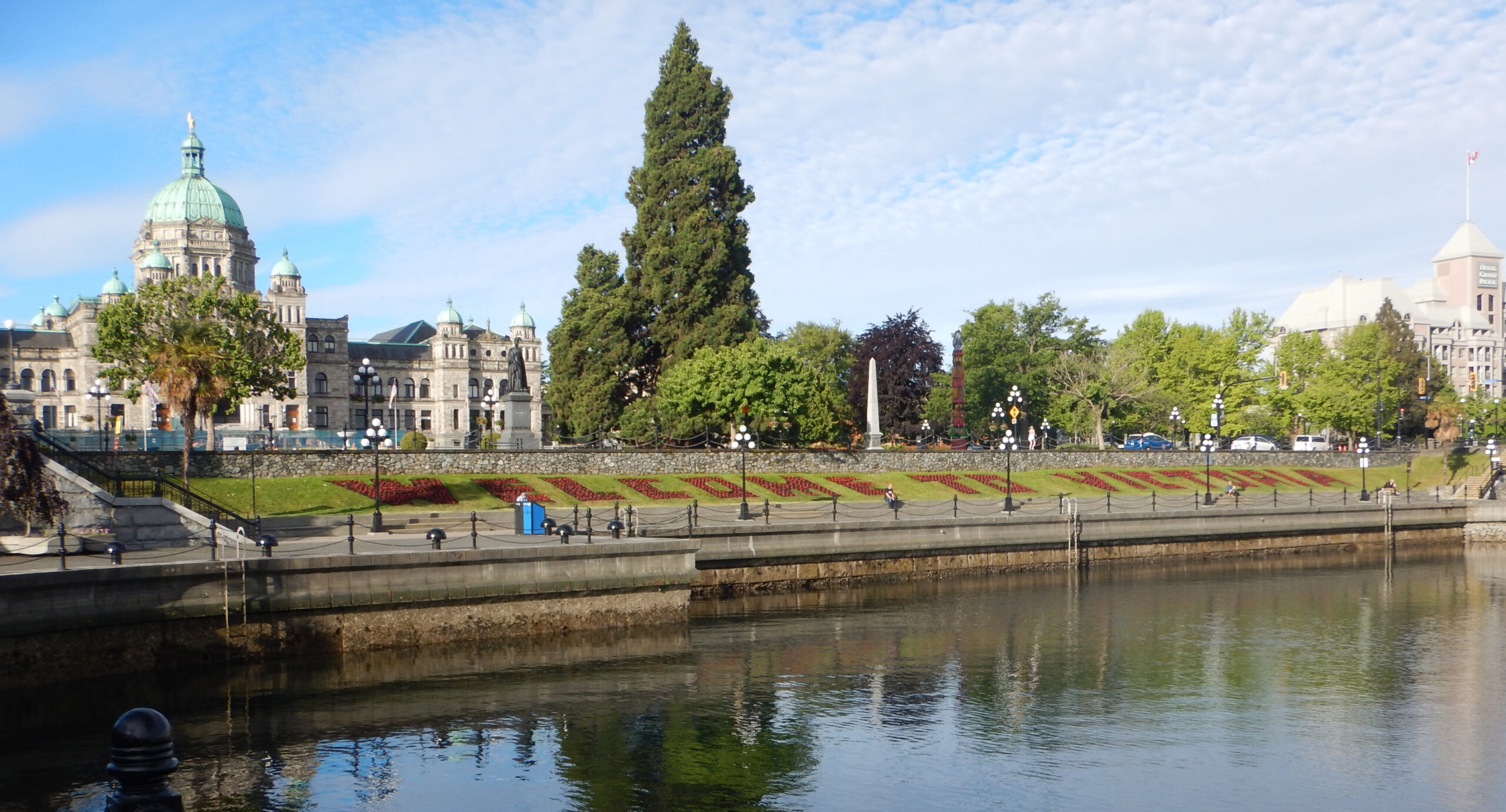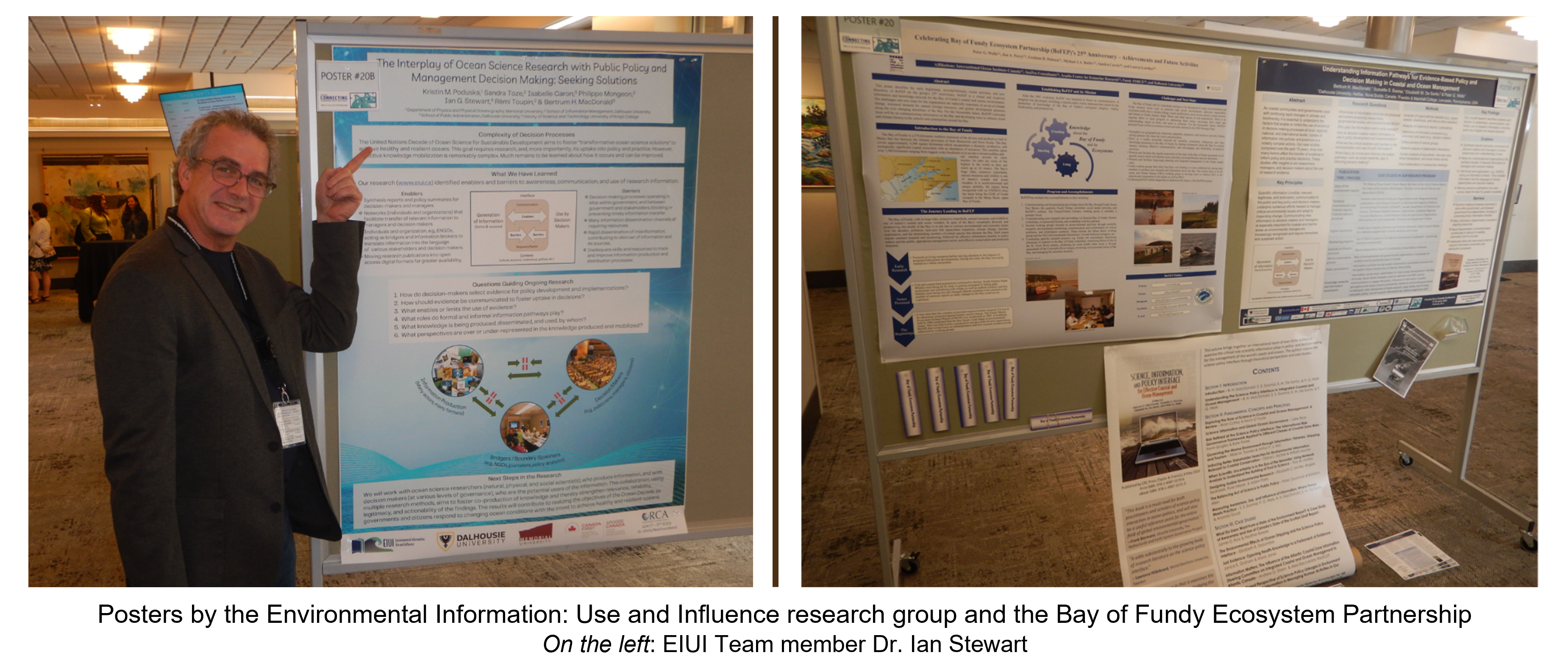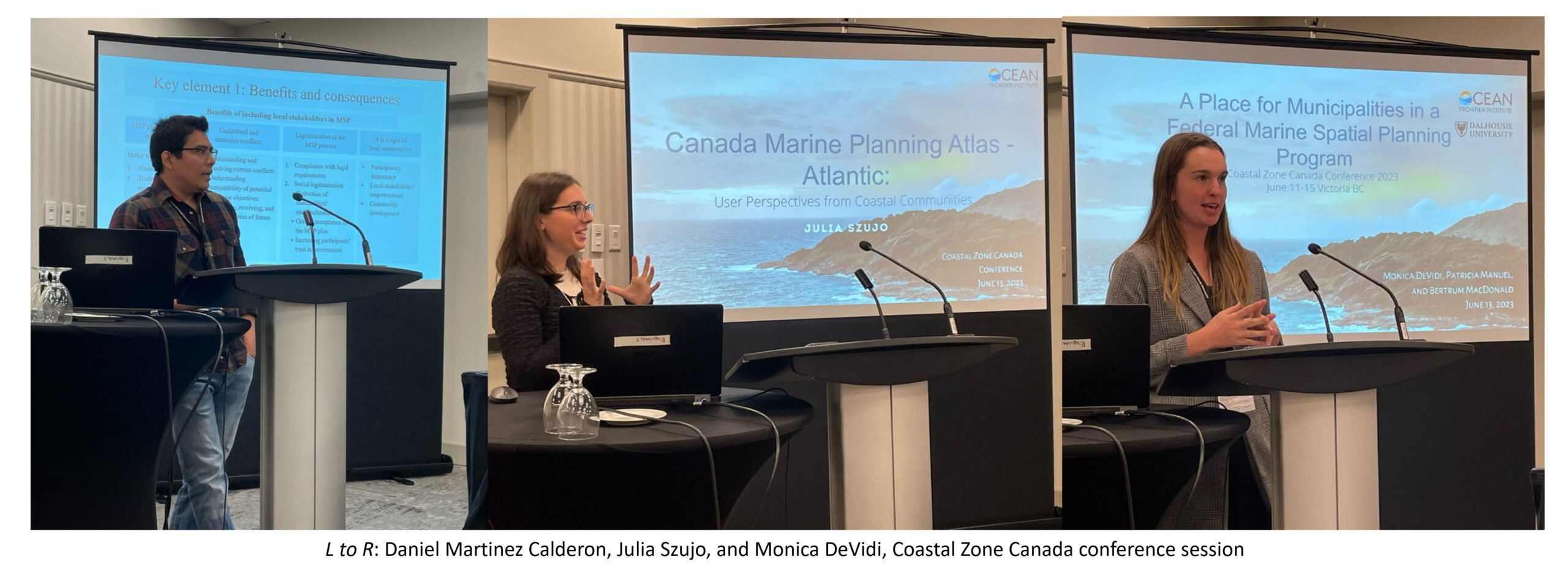“Connecting with the coast” was an apt theme for the biennial Coastal Zone Canada (CZC) conference held in Victoria, British Columbia on 11-15 June 2023. Officially endorsed by the UN Ocean Decade and attended by about 500 registrants, the conference offered many opportunities for coastal, professional, and personal connections. Over four days of concurrent sessions on a wide-range of topics pertaining to coastal and ocean management were coupled with a very diverse, information-packed exhibit hall that included groups representing numerous sectors involved in ocean science, management, monitoring, and public engagement.
Dr. Peter Wells, representing the Environmental Information: Use and Influence (EIUI) research group and the Bay of Fundy Ecosystem Partnership (BoFEP), and Dr. Patricia Manuel, Daniel Martinez Calderon, and Julia Szujo, representing the Marine Spatial Planning research group of the Ocean Frontier Institute, attended the conference and write about their experiences and insights.
Peter Wells: I presented the paper (Lowther et al., 2023) on BoFEP’s activity and plans for ocean literacy, four posters, and chaired a session. I attended all plenaries, 12 paper sessions, and the poster session. My paper and the posters were well-attended and I made new connections with numerous practitioners. The following are some important points pertaining to the aims and objectives of the Environmental Information: Use and Influence research program that I noted while attending this conference’s papers, discussions, and displays:
- In this UN Ocean Decade, collaboration and networking are critical to effective ocean management.
- All forms of knowledge (e.g., western science, Indigenous knowledge, local) must be used to protect coastal species and spaces.
- Climate change is clearly impacting the globe, as shown by ongoing processes such as coastal erosion.
- Climate change is the critical environmental issue of our time and demands that all members of society be knowledgeable about it and be generally ocean literate.
- Nature based solutions can protect coastlines prone to erosion enhanced by climate change.
- Bottom-up engagement of communities, including those of Indigenous peoples, is essential for effective ocean management and its component activities, such as marine spatial planning.
- To be successful, marine spatial planning must be mostly a bottom-up process, involving coastal communities and local municipal planners. Local knowledge, including historical and cultural understanding, should be considered.
It was abundantly clear from this conference and also earlier conferences organized by the Coastal Zone Canada Association that an ocean literate and ocean-involved population is critically important for effective coastal and ocean management in an era of accelerating ocean change. The topic itself was explicitly discussed in the session where my paper was presented and also considered in other sessions. In the ocean literacy session, the talks focused on the contributions of whale watching, film and photography, and community attitudes and perspectives about the coast. In addition, many displays and groups (across all sectors) in the exhibit hall centred on public awareness and engagement with coastal and ocean issues. Clearly, the premise that an ocean literate public is required to support effective coastal and ocean management (including policy and decision-making), protection of marine biodiversity, and enlightened response to climate change was at the heart of this conference. The three substantial take-home messages for successful advancement of ocean literacy and coastal management were:
- Network across interested coastal groups;
- Involve coastal communities directly with projects; and
- Involve Indigenous peoples and respect their histories of deep connections with the coast.
Further discussion of ocean literacy and the research work of the EIUI and BoFEP groups can be continued in the BoFEP Workshop, which will be held in the spring 2024, and at the next biennial Coastal Zone Canada conference, which will be held in Charlottetown, Prince Edward Island in 2025.
Patricia Manuel, Daniel Martinez Calderon, and Julia Szujo: Our research group presented a poster (Manuel et al., 2023) showing the trajectory of our work between 2018 and 2023. We also organized a special session entitled “Coastal Communities in Marine Spatial Planning: Connecting across the Coastal Zone.” This session about marine spatial planning (MSP) through a local lens was designed to draw attention to local interests, information, and perspectives in a typically a high-level, top-down process. In addition, the session highlighted the link between community planning and marine planning, especially where jurisdictional boundaries may present obstacles to local government involvement in MSP. As chair, Patricia introduced the relevance of MSP for coastal communities. Jason Naug (Department of Fisheries and Oceans (DFO), Maritimes Region) provided an overview of MSP and described the structure and objectives of the federal MSP program (Naug, 2023). Although MSP is usually described as a participatory process, stakeholder engagement is heavily critiqued in the MSP social science literature. Daniel outlined what constitutes meaningful stakeholder engagement, especially at the local level (Martinez Calderon, 2023a). Spatial data are the foundation of MSP, often organized into atlases and Julia spoke about her study of the new Canada Marine Planning Atlas-Atlantic with community-level users in Nova Scotia, looking at its application for local contexts (Szujo, 2023). The economies and culture of coastal communities, which are tightly connected to the sea, will be impacted by MSP decisions. How are community interests and values captured in MSP, which often operates at a high level or is more comfortable engaging elite interests? Where do local communities fit when jurisdictional boundaries exclude them from marine decision-making? Monica DeVidi explored these questions in relation to the Scotian Shelf-Bay of Fundy marine planning area in her presentation (DeVidi, 2023). For many in attendance, this session was their first introduction to MSP on the Atlantic coast of Canada, and also the first time they realized that high-level, national programs, even when scaled to the regional level, can miss the nuances of local interests and the contributions of local actors. Marine governance in Canada does not include involvement by municipalities, despite that their control over land use impacts the marine environment and coastal infrastructure that supports the “blue economy.” Marine planning could benefit from community and land use planning practice, particularly engagement and connecting with community-based participants. Furthermore, coastal communities must consider their marine coastal setting when planning shore land use or identifying economic development opportunities.
Daniel spoke about his doctoral research in the session “Coastal and Marine Planning, Conservation and Management to Increase Resilience” (Martinez Calderon, 2023b). He outlined preliminary results from interviews with practitioners from seven MSP cases globally and with MSP scholars from four geographic regions. He focused on essential issues needed to encourage local participation in MSP: Who and how should stakeholders be engaged? When and what level should stakeholders be engaged? and What prevents or enables local stakeholder participation in MSP.
Patricia also participated in a second session, which involved the Dalhousie University-based Benthic Ecosystem Mapping and Engagement (BEcoME) research group of the Ocean Frontier Institute. This group is studying how imaging technology combined with other types of information that includes professional and local knowledge create a holistic understanding of the benthic environment and can provide information for marine decision-making. Team members Dr. Sara Spike and Leah Fulton spoke about local, experiential knowledge about the sea floor and presented the information through ArcGIS StoryMap.
With three plenaries, and 75 concurrent, special, and poster sessions, it was difficult to choose what event to attend. Patricia mainly selected sessions on the theme of coastal and marine planning, conservation, and management to increase resilience, as well as sessions on coastal hazards, risks, and management. A key take-away from these sessions is that planning on the Canadian west coast is definitely different from the east coast! The Marine Planning Partnership (MaPP) received extensive attention as it is the only marine spatial plan in Canada, which is coastal-focussed (of necessity) and process-oriented. This plan highlighted deep engagement and collaborative plan making between Pacific north coast Indigenous nations and the Province of British Columbia. The province is also developing a coastal marine strategy and the District of West Vancouver is preparing a Coastal Marine Management Plan. This interest and activity in coastal planning in British Columbia contrasts with inertia in Atlantic Canada. The question is: Why? Discovering the answer(s) needs further examination, but knowing how to spot and then catch and ride a rising political wave of interest in the coastal zone seems to be a core skill in achieving coastal and marine planning in Canada.
We made many new connections and deepened our understanding of place-based marine and coastal matters. Our key takeaways include:
- Inclusive language plays a pivotal role in shaping the way we perceive and address environmental issues and acknowledge the wide range of perspectives of diverse stakeholders in coastal and marine environments. For example, the City of Vancouver’s Sea2City Design Challenge emphasizes inclusive language that includes decolonized language (City of Vancouver, 2022).
- The coastal planning focus in the Maritime provinces is different from British Columbia: British Columbia places a stronger emphasis on emergency preparedness due to its vulnerability to natural hazards like tsunamis. Meanwhile, the Maritimes prioritizes sustainable resource management and biodiversity conservation alongside addressing climate change challenges.
- Representation from the Northern coast of Canada was limited, possibly due to Arctic professionals’ capacity to attend. This lack raises concerns about inclusivity in coastal discussions, emphasizing the importance of recognizing and including all coastal communities’ perspectives in future marine planning efforts across Canada.
Overall, the conference was very well organized and successful in connecting coastal and marine researchers and professionals. The conference themes were broad and relevant given current challenges in marine and coastal areas. Of course, four intense days of programs required a high level of mental attention! The opportunities for interchange among the registrants were welcomed as they are catalysts for synergies and new ideas that potentially could contribute to the sustainable management of our oceans and coasts.
References
City of Vancouver (2022). Sea2City design challenge project report. https://vancouver.ca/files/cov/sea2city-design-challenge-project-report.pdf
DeVidi, M. (2023). A place for municipalities in federal marine spatial planning. Session presentation at the 2023 Coastal Zone Canada conference, Victoria.
Lowther, L., Butler, M. J. A., & Wells, P. G. (2023). Promoting ocean and climate literacy to communities around the Bay of Fundy and its watersheds. Paper presented at the 2023 Coastal Zone Canada conference, Victoria.
MacDonald, B. H., Soomai, S. S., De Santo, E. M., & Wells, P. G. (2023). Science, information, and policy interface for effective coastal and ocean management (CRC Press). Book poster presented at the 2023 Coastal Zone Canada conference, Victoria.
MacDonald, B. H., Soomai, S. S., De Santo, E. M., & Wells, P. G. (2023). Understanding information pathways for evidence-based policy and decision-making in coastal and ocean Management. Poster presented at the 2023 Coastal Zone Canada conference, Victoria.
Manuel, P., MacDonald, B. H., Martinez Calderon, D., Szujo, J., & DeVidi, M. (2023). Coastal communities in marine spatial planning: Connecting land and sea. Poster presented at the 2023 Coastal Zone Canada conference, Victoria.
Martinez Calderon, D. (2023a). Community-based MSP: Stakeholder engagement strategies across the coastal zone. Session presentation at the 2023 Coastal Zone Canada conference, Victoria.
Martinez Calderon, D. (2023b). Locally adapted marine spatial planning in practice: A review of recent cases. Paper presented at the 2023 Coastal Zone Canada conference, Victoria.
Naug, J. (2023). Overview of MSP in the Scotia Shelf-Bay of Fundy marine bioregion. Session presentation at the 2023 Coastal Zone Canada conference, Victoria.
Poduska, K. M., Toze, S., Caron, I., Mongeon, P., Stewart, I. G., Toupin, R., & MacDonald, B. H. (2023). The interplay of ocean science research with public policy and management decision-making: Seeking solutions. Poster presented at the 2023 Coastal Zone Canada conference, Victoria.
Szujo, J. (2023). The Canada marine atlas – Atlantic – user perspectives from coastal communities. Session presentation at the 2023 Coastal Zone Canada conference, Victoria.
Wells, P. G., Percy, J. A., Daborn, G. R., Butler, M. J. A., Currie, S., & Lowther, L. (2023). Celebrating Bay of Fundy Ecosystem Partnership (BoFEP)’s 25th anniversary – achievements and future activities. Poster presented at the 2023 Coastal Zone Canada conference, Victoria.
Authors: Peter G. Wells, Patricia Manuel, Daniel Martinez Calderon, and Julia Szujo
Acknowledgements: Photographs by Peter G. Wells and Jason Naug


